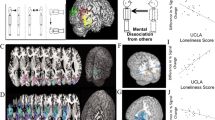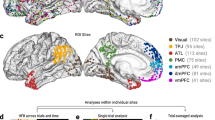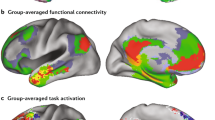Abstract
According to recently proposed interactive dual-process theories, mentalizing abilities emerge from the coherent interaction between two physically distinct neural systems: (1) the mirror network, coding for the low-level embodied representations involved in pre-reflective sociocognitive processes and (2) the mentalizing network per se, which codes for higher level representations subtending the reflective attribution of psychological states. However, although the latest studies have shown that the core areas forming these two neurocognitive systems do indeed maintain effective connectivity during mentalizing, it is unclear whether an intact mirror system (and, more specifically, its anterior node, namely the posterior inferior frontal cortex) is a prerequisite for accurate mentalistic inferences. Intraoperative brain mapping via direct electrical stimulation offers a unique opportunity to address this issue. Electrical stimulation of the brain creates a “virtual” lesion, which provides functional information on well-defined parts of the cerebral cortex. In the present study, five patients were mapped in real time while they performed a mentalizing task. We found six responsive sites: four in the lateral part of the right pars opercularis and two in the dorsal part of the right pars triangularis. On the subcortical level, two additional sites were located within the white matter connectivity of the pars opercularis. Taken as a whole, our results suggest that the right inferior frontal cortex and its underlying axonal connectivity have a key role in mentalizing. Specifically, our findings support the hypothesis whereby transient, functional disruption of the mirror network influences higher order mentalistic inferences.



Similar content being viewed by others
References
Adams RB Jr, Rule NO, Franklin RG Jr, Wang E, Stevenson MT, Yoshikawa S, Nomura M, Sato W, Kveraga K, Ambady N (2010) Cross-cultural reading the mind in the eyes: an fMRI investigation. J Cogn Neurosci 22(1):97–108
Amodio DM, Frith CD (2006) Meeting of minds: the medial frontal cortex and social cognition. Nat Rev Neurosci 7(4):268–277
Barbey AK, Colom R, Grafman J (2012) Distributed neural system for emotional intelligence revealed by lesion mapping. Soc Cogn Affect Neurosci 6:6
Baron-Cohen S, Ring H, Moriarty J, Schmitz B, Costa D, Ell P (1994) Recognition of mental state terms. Clinical findings in children with autism and a functional neuroimaging study of normal adults. Br J Psychiatry 165(5):640–649
Baron-Cohen S, Ring HA, Wheelwright S, Bullmore ET, Brammer MJ, Simmons A, Williams SC (1999) Social intelligence in the normal and autistic brain: an fMRI study. Eur J Neurosci 11(6):1891–1898
Baron-Cohen S, Wheelwright S, Hill J, Raste Y, Plumb I (2001) The “Reading the Mind in the Eyes” test revised version: a study with normal adults, and adults with Asperger syndrome or high-functioning autism. J Child Psychol Psychiatry 42(2):241–251
Baron-Cohen S, Ring H, Chitnis X, Wheelwright S, Gregory L, Williams S, Brammer M, Bullmore E (2006) fMRI of parents of children with Asperger Syndrome: a pilot study. Brain Cogn 61(1):122–130
Barrett LF, Satpute AB (2013) Large-scale brain networks in affective and social neuroscience: towards an integrative functional architecture of the brain. Curr Opin Neurobiol 23(3):361–372
Bohl V, van den Bos W (2012) Toward an integrative account of social cognition: marrying theory of mind and interactionism to study the interplay of Type 1 and Type 2 processes. Front Hum Neurosci 6(274):11
Bzdok D, Schilbach L, Vogeley K, Schneider K, Laird A, Langner R, Eickhoff S (2012) Parsing the neural correlates of moral cognition: ALE meta-analysis on morality, theory of mind, and empathy. Brain Struct Funct 217(4):783–796
Carr L, Iacoboni M, Dubeau M-C, Mazziotta JC, Lenzi GL (2003) Neural mechanisms of empathy in humans: a relay from neural systems for imitation to limbic areas. Proc Natl Acad Sci 100(9):5497–5502
Carrington SJ, Bailey AJ (2009) Are there theory of mind regions in the brain? A review of the neuroimaging literature. Hum Brain Mapp 30(8):2313–2335
Carruthers P, Smith PK (1996) Theories of theories of mind. Cambridge University Press, UK
Caspers S, Zilles K, Laird AR, Eickhoff SB (2010) ALE meta-analysis of action observation and imitation in the human brain. NeuroImage 50(3):1148–1167
Castelli I, Baglio F, Blasi V, Alberoni M, Falini A, Liverta-Sempio O, Nemni R, Marchetti A (2010) Effects of aging on mindreading ability through the eyes: an fMRI study. Neuropsychologia 48(9):2586–2594
Coricelli G (2005) Two-levels of mental states attribution: from automaticity to voluntariness. Neuropsychologia 43(2):294–300
Dapretto M, Davies MS, Pfeifer JH, Scott AA, Sigman M, Bookheimer SY, Iacoboni M (2006) Understanding emotions in others: mirror neuron dysfunction in children with autism spectrum disorders. Nat Neurosci 9(1):28–30
Desmurget M, Bonnetblanc F, Duffau H (2007) Contrasting acute and slow-growing lesions: a new door to brain plasticity. Brain 130(Pt 4):898–914
Desmurget M, Song Z, Mottolese C, Sirigu A (2013) Re-establishing the merits of electrical brain stimulation. Trends in cognitive sciences 17(9):442–449
Duffau H, Capelle L, Sichez N, Denvil D, Lopes M, Sichez JP, Bitar A, Fohanno D (2002) Intraoperative mapping of the subcortical language pathways using direct stimulations. An anatomo-functional study. Brain 125(Pt 1):199–214
Duffau H, Gatignol P, Mandonnet E, Peruzzi P, Tzourio-Mazoyer N, Capelle L (2005) New insights into the anatomo-functional connectivity of the semantic system: a study using cortico-subcortical electrostimulations. Brain 128(Pt 4):797–810
Duffau H, Herbet G, Moritz-Gasser S (2013) Toward a pluri-component, multimodal, and dynamic organization of the ventral semantic stream in humans: lessons from stimulation mapping in awake patients. Front Syst Neurosci 7:44
Gallagher HL, Frith CD (2003) Functional imaging of ‘theory of mind’. Trends Cogn Sci 7(2):77–83
Gallese V, Goldman A (1998) Mirror neurons and the simulation theory of mind-reading. Trends Cogn Sci 2(12):493–501
Gallese V, Rochat MJ, Berchio C (2013) The mirror mechanism and its potential role in autism spectrum disorder. Dev Med Child Neurol 55(1):15–22
Grezes J, Decety J (2001) Functional anatomy of execution, mental simulation, observation, and verb generation of actions: a meta-analysis. Hum Brain Mapp 12(1):1–19
Hamilton AF (2013) Reflecting on the mirror neuron system in autism: a systematic review of current theories. Dev Cogn Neurosci 3:91–105
Hecht EE, Gutman DA, Preuss TM, Sanchez MM, Parr LA, Rilling JK (2013) Process versus product in social learning: comparative diffusion tensor imaging of neural systems for action execution-observation matching in macaques, chimpanzees, and humans. Cereb Cortex 23(5):1014–1024
Herbet G, Lafargue G, Bonnetblanc F, Moritz-Gasser S, Duffau H (2013) Is the right frontal cortex really crucial in the mentalizing network? A longitudinal study in patients with a slow-growing lesion. Cortex 49(10):2711–2727
Herbet G, Lafargue G, Bonnetblanc F, Moritz-Gasser S, de Menjot Champfleur N, Duffau H (2014) Inferring a dual-stream model of mentalizing from associative white matter fibres disconnection. Brain 137(Pt 3):944–959
Iacoboni M, Dapretto M (2006) The mirror neuron system and the consequences of its dysfunction. Nat Rev Neurosci 7(12):942–951
Iacoboni M, Molnar-Szakacs I, Gallese V, Buccino G, Mazziotta JC, Rizzolatti G (2005) Grasping the intentions of others with one’s own mirror neuron system. PLoS Biol 3(3):e79
Kana RK, Libero LE, Hu CP, Deshpande HD, Colburn JS (2014) Functional brain networks and white matter underlying theory-of-mind in autism. Soc Cogn Affect Neurosci 9(1):98–105
Kennedy DP, Adolphs R (2012) The social brain in psychiatric and neurological disorders. Trends Cogn Sci 16(11):559–572
Keysers C, Gazzola V (2007) Integrating simulation and theory of mind: from self to social cognition. Trends Cogn Sci 11(5):194–196
Khan OH, Herbet G, Moritz-Gasser S, Duffau H (2013) The role of left inferior fronto-occipital fascicle in verbal perseveration: a brain electrostimulation mapping study. Brain Topogr 18:18
Krainik A, Duffau H, Capelle L, Cornu P, Boch AL, Mangin JF, Le Bihan D, Marsault C, Chiras J, Lehericy S (2004) Role of the healthy hemisphere in recovery after resection of the supplementary motor area. Neurology 62(8):1323–1332
Lieberman MD (2007) Social cognitive neuroscience: a review of core processes. Annu Rev Psychol 58:259–289
Lombardo MV, Chakrabarti B, Bullmore ET, Sadek SA, Pasco G, Wheelwright SJ, Suckling J, Consortium MA, Baron-Cohen S (2010a) Atypical neural self-representation in autism. Brain 133(2):611–624
Lombardo MV, Chakrabarti B, Bullmore ET, Wheelwright SJ, Sadek SA, Suckling J, Baron-Cohen S (2010b) Shared neural circuits for mentalizing about the self and others. J Cogn Neurosci 22(7):1623–1635
Makris N, Kennedy DN, McInerney S, Sorensen AG, Wang R, Caviness VS, Pandya DN (2005) Segmentation of subcomponents within the superior longitudinal fascicle in humans: a quantitative, in vivo, DT-MRI study. Cereb Cortex 15(6):854–869
Mar RA (2011) The neural bases of social cognition and story comprehension. Annu Rev Psychol 62:103–134
Mars RB, Neubert FX, Noonan MP, Sallet J, Toni I, Rushworth MF (2012) On the relationship between the “default mode network” and the “social brain”. Front Hum Neurosci 6(189):00189
Martino J, De Witt Hamer PC, Berger MS, Lawton MT, Arnold CM, de Lucas EM, Duffau H (2013) Analysis of the subcomponents and cortical terminations of the perisylvian superior longitudinal fasciculus: a fiber dissection and DTI tractography study. Brain Struct Funct 218(1):105–121
Molenberghs P, Cunnington R, Mattingley JB (2009) Is the mirror neuron system involved in imitation? A short review and meta-analysis. Neurosci Biobehav Rev 33(7):975–980
Molenberghs P, Cunnington R, Mattingley JB (2012) Brain regions with mirror properties: a meta-analysis of 125 human fMRI studies. Neurosci Biobehav Rev 36(1):341–349
Molnar-Szakacs I, Uddin LQ (2013) Self-processing and the default mode network: interactions with the mirror neuron system. Front Hum Neurosci 7:571
Moor BG, Macks ZA, Guroglu B, Rombouts SA, Molen MW, Crone EA (2012) Neurodevelopmental changes of reading the mind in the eyes. Soc Cogn Affect Neurosci 7(1):44–52
Moritz-Gasser S, Herbet G, Duffau H (2013) Mapping the connectivity underlying multimodal (verbal and non-verbal) semantic processing: a brain electrostimulation study. Neuropsychologia 51(10):1814–1822
Ojemann G, Mateer C (1979) Human language cortex: localization of memory, syntax, and sequential motor-phoneme identification systems. Science 205(4413):1401–1403
Parkinson C, Wheatley T (2012) Relating anatomical and social connectivity: white matter microstructure predicts emotional empathy. Cereb Cortex 24(3):614–625
Penfield W, Jasper H (1954) Epilepsy and the functional anatomy of the human brain. Little, Brown, Boston
Premack D, Woodruff G (1978) Does the chimpanzee have a theory of mind? Behav Brain Sci 1(04):515–526
Rech F, Herbet G, Moritz-Gasser S, Duffau H (2013) Disruption of bimanual movement by unilateral subcortical electrostimulation. Hum Brain Mapp 25(10):22413
Rilling JK, Glasser MF, Preuss TM, Ma X, Zhao T, Hu X, Behrens TE (2008) The evolution of the arcuate fasciculus revealed with comparative DTI. Nat Neurosci 11(4):426–428
Rizzolatti G, Craighero L (2004) The mirror-neuron system. Annu Rev Neurosci 27:169–192
Russell TA, Rubia K, Bullmore ET, Soni W, Suckling J, Brammer MJ, Simmons A, Williams SC, Sharma T (2000) Exploring the social brain in schizophrenia: left prefrontal underactivation during mental state attribution. Am J Psychiatry 157(12):2040–2042
Schilbach L, Eickhoff SB, Rotarska-Jagiela A, Fink GR, Vogeley K (2008) Minds at rest? Social cognition as the default mode of cognizing and its putative relationship to the “default system” of the brain. Conscious Cogn 17(2):457–467
Schilbach L, Bzdok D, Timmermans B, Fox PT, Laird AR, Vogeley K, Eickhoff SB (2012) Introspective minds: using ALE meta-analyses to study commonalities in the neural correlates of emotional processing, social & unconstrained cognition. PLoS One 7(2):e30920
Schucht P, Moritz-Gasser S, Herbet G, Raabe A, Duffau H (2013) Subcortical electrostimulation to identify network subserving motor control. Hum Brain Mapp 34(11):3023–3030
Schurz M, Radua J, Aichhorn M, Richlan F, Perner J (2014) Fractionating theory of mind: A meta-analysis of functional brain imaging studies. Neurosci Biobehav Rev 42:9–34
Shamay-Tsoory SG, Aharon-Peretz J, Perry D (2009) Two systems for empathy: a double dissociation between emotional and cognitive empathy in inferior frontal gyrus versus ventromedial prefrontal lesions. Brain 132(Pt 3):617–627
Spreng RN, Mar RA, Kim AS (2009) The common neural basis of autobiographical memory, prospection, navigation, theory of mind, and the default mode: a quantitative meta-analysis. J Cogn Neurosci 21(3):489–510
Spunt RP, Lieberman MD (2012) An integrative model of the neural systems supporting the comprehension of observed emotional behavior. NeuroImage 59(3):3050–3059
Spunt RP, Lieberman MD (2013) The busy social brain: evidence for automaticity and control in the neural systems supporting social cognition and action understanding. Psychol Sci 24(1):80–86
Uddin LQ, Iacoboni M, Lange C, Keenan JP (2007) The self and social cognition: the role of cortical midline structures and mirror neurons. Trends Cogn Sci 11(4):153–157
van Geemen K, Herbet G, Moritz-Gasser S, Duffau H (2013) Limited plastic potential of the left ventral premotor cortex in speech articulation: evidence from intraoperative awake mapping in glioma patients. Hum Brain Mapp 35(4):1587–1596
Van Overwalle F (2009) Social cognition and the brain: a meta-analysis. Hum Brain Mapp 30(3):829–858
Van Overwalle F, Baetens K (2009) Understanding others’ actions and goals by mirror and mentalizing systems: a meta-analysis. NeuroImage 48(3):564–584
Whitaker HA, Ojemann GA (1977) Graded localisation of naming from electrical stimulation mapping of left cerebral cortex. Nature 270(5632):50–51
Zaki J, Ochsner K (2012) The neuroscience of empathy: progress, pitfalls and promise. Nat Neurosci 15(5):675–680
Zaki J, Weber J, Bolger N, Ochsner K (2009) The neural bases of empathic accuracy. Proc Natl Acad Sci USA 106(27):11382–11387
Acknowledgments
Guillaume Herbet received a fellowship from the Association pour la Recherche sur le Cancer (Grant Number: DOC20120605069).
Author information
Authors and Affiliations
Corresponding author
Electronic supplementary material
Below is the link to the electronic supplementary material.
Video 1.avi: A sample extract of the intraoperative stimulation procedure. This video shows a sample extract of the cortical mapping procedure in patient FC while she was performing the mentalizing task.
Rights and permissions
About this article
Cite this article
Herbet, G., Lafargue, G., Moritz-Gasser, S. et al. Interfering with the neural activity of mirror-related frontal areas impairs mentalistic inferences. Brain Struct Funct 220, 2159–2169 (2015). https://doi.org/10.1007/s00429-014-0777-x
Received:
Accepted:
Published:
Issue Date:
DOI: https://doi.org/10.1007/s00429-014-0777-x




